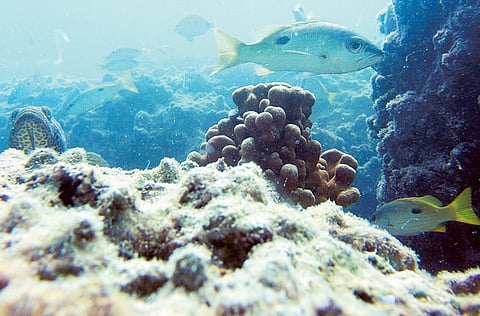Arabian Gulf coral reefs dying a slow death
Extreme weather events and coastal development hurt fragile marine ecosystem

Abu Dhabi: The coral content in Arabian Gulf reefs has declined by up to 50 per cent, posing a threat to fish stocks and marine habitats, an expert has warned.
Dr John Burt, associate professor of biology at New York University Abu Dhabi (NYUAD), told Gulf News that extreme weather events also creates further stress and causes mass mortality of coral.
“A major weather event called El Nino is expected to occur again this summer. This usually raises water temperatures by 2.5 degrees Celsius. While El Nino’s effects vary, the one in 1998 caused great loss of corals around the world, including in the Arabian Gulf, and many have not yet been able to regenerate,” Dr Burt, who is also head of the NYUAD Marine Biology Laboratory, said.
“It is not usually possible to engineer solutions against weather phenomena, but we can work to reduce other stressors, such as dredging and coastal reclamation, during the period. This would be beneficial when El Nino affects the Arabian Gulf in late August and September this year,” he added.
Coral reefs play an important role in ensuring marine biodiversity by providing food and nursing grounds for fish and other marine organisms. Although the waters of the Arabian Gulf pose many constraints to coral life, including high salinity, their subsistence presents scientists with an opportunity to learn more about how corals cope with extreme conditions.
Global warming and coastal development are, however, negatively affecting the health of coral in the Arabian Gulf. Bleaching events, in which there is a breakdown of the relationship between coral and the algae that live inside them and provide food, also occur in warmer water temperatures.
“Certain species, such as table corals, have a complex structure and many types of fish are able to live in and off them. These have low resilience and their coral cover has fallen greatly in the reefs. In fact, 90 per cent of the reefs are now made of brain and mound coral, which provide much less support for marine organisms,” Dr Burt explained.
Asked about what could be done to support corals, the expert called for long-term monitoring, and management of marine activities.
“We have previously undertaken research in collaboration with the Environment Agency Abu Dhabi (EAD), and are now in the process of drawing up another agreement,” he said.
Sign up for the Daily Briefing
Get the latest news and updates straight to your inbox



